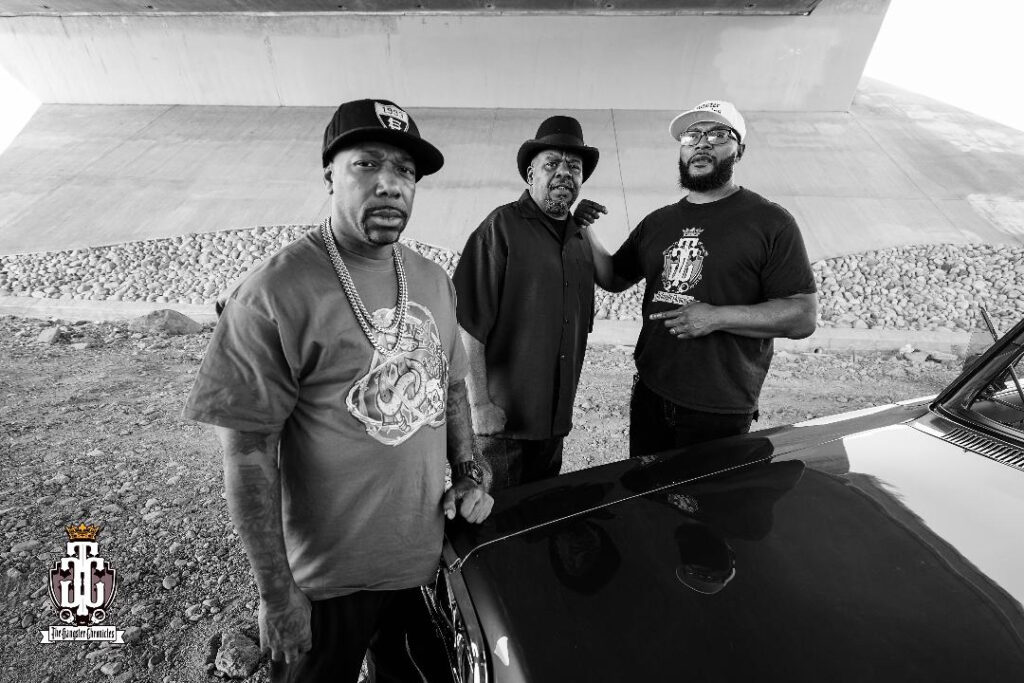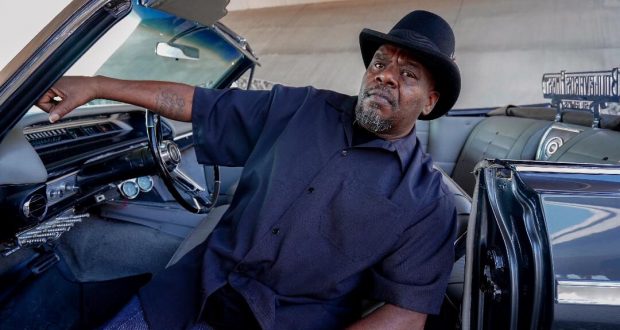In the early ’90s, Death Row Records had a roster that could compete with any label’s top talent, and CEO Suge Knight earned a reputation as one of the most feared men in the industry. James McDonald, then known as Mob James, was the instrument of Knight’s intimidation. McDonald served as Death Row’s muscle and Suge’s go-to-guy for years.
Knight and McDonald used “any means necessary” to get their point across to the label’s opponents. That was then and this is now. McDonald wields a starkly different kind of influence today. Through his podcast, “The Gangster Chronicles,” he draws on his experience and wisdom to steer vulnerable young men away from gangs and street life. Knowing how deeply he was affected by the absence of his biological father, McDonald strives to be a positive male role model in the lives of young men; he feels that if he can just help one individual, then his efforts have not been in vain. The podcast has a bright future: It was picked up by the Black Effect Podcast Network, a joint venture of Charlamagne Tha God and iHeartMedia to amplify black voices.
On the podcast, McDonald and his co-hosts, legendary Compton rapper MC Eiht and music insider Norman Steele, dissect a range of topics and use important aspects of their lives as teachable moments. McDonald spoke with Zenger News about his days at Death Row Records, his transition to podcast host, and the one lesson he retains from his days as Mob James.
Percy Crawford interviewed James McDonald for Zenger News.
Zenger News: During Death Row Records’ days as the most feared record label in the industry, you were Suge Knight’s muscle. Is that a proper introduction for you?
James McDonald: Yeah! That’s the best way to put it. He really didn’t get started… In ’88 when I got out of prison, he came to me — he didn’t tell me his journey, but he came to me — and asked me did I want to work with him. He looked out for me when I came, and the next thing I knew, I was on an airplane and everything else with him while on parole. I was that guy that he needed to … let’s say, persuade other people into certain things. Yeah, I was that guy for him.
Zenger: Fresh out of prison to being on airplanes with Suge Knight. Was that something new to you that you had never experienced before?
McDonald: Nah! Honestly, the airplanes wasn’t for me. That’s why I passed the torch to my brother [Buntry] because I didn’t want to fly no more. I didn’t dig that. The whole thing, when Suge came, it was all new. All I knew was the hood, you know what I’m saying? When he came and got me, all that stuff was brand new to me. Which, I liked it. The fighting part and being aggressive, I already had that.
Zenger: That was right up your alley.
McDonald: Oh, yeah! Definitely! Getting paid to do what I do [laughing]. It was a different way of gettin’ it, definitely.

Zenger: Typically, everyone wants the side of the story where you and Suge fell out. Suge was a very smart man, so I want to know, what did you learn from him while spending so much time around him?
McDonald: How to take care of business. The way he conducted his business was a good thing. And me and Suge was a cool team in the beginning, because learning what Suge did and then Suge seeing the way that I got down from a neighborhood perspective, Suge was like, we both had something to offer each other. Just seeing the way Suge dealt with different people. Mind you, I never dealt with people that was on that level, as far as the way they talked and all that. I had to get used to that real quick dealing with him because he would take me, I would meet people, and I would feel uncomfortable. Because my conversation was, “What’s going on? How you doing?” People would look at me like, “What the fuck is he talking about?” Signing my name — I was so far into the gang shit, I wasn’t writing in cursive. My whole thing was gang writing. I learned a lot from him as far as just being that street cat. Suge was always in the street, but not like we were. So, he learned from me as well as I learned from him.
Zenger: A lot of people said Suge really changed when Tupac came on board. Do you agree with that, or did you see him changing prior to Tupac coming to Death Row?
McDonald: Nah, his change came before that. When Suge started really making the money, you saw the change in him. I used to try to keep him grounded and tell him, “Suge, you don’t have to be blasted all over the magazines. You don’t have to be out there on the frontline. That’s what we’re here for. I got this.” It was something that Suge wanted to be. Suge wanted to be seen, Suge wanted to be that guy. And when he became that guy, he just lost control. When Tupac came, he just … Lord have mercy. He was off the chain when Tupac came. That’s when the money really started coming. But right before that, Suge started wearing red suits, and started smoking the cigars and shit, and I knew we were headed downward after that.
Zenger: The narrative is that you didn’t like Tupac. You didn’t necessarily agree with the way he moved. Is that true?
McDonald: I had no reason not to like Tupac. I didn’t really deal with that dude like that. My brother Buntry and all of them were into the artists, hanging and smoking weed with those guys. I never smoked weed. I never dealt with them like that. My thing with Tupac is when Tupac wanted to be and start claiming my neighborhood. And I had a thing for that. I lost a lot of homeboys in this gangbangin’ shit. How you going to bring Tupac to the hood — and this is Suge I’m telling this to — how are you going to bring him to the hood and say he’s the homie? He ain’t the homie. I just didn’t like that, cause you ain’t no one-day cat. You can’t be that. You ain’t broke no bread, you ain’t lost no blood over here, so I felt a certain kind of way about that. But my brother and them felt that, “Ah, he the homie. We kickin’ it.” Nah … let him be the homie, but he ain’t from the neighborhood. That was my only thing about Tupac. And the way Tupac changed when he got around all these gorillas. He felt like he couldn’t be touched. He became disrespectful. That was the only thing I didn’t like about that. You’re the artist, you making money for this company, that’s all he should’ve been. And I don’t think he should’ve been, or could’ve been, from no motherfucking blood just like that, overnight. I never had no bad business for him, though.
Zenger: Last thing on the Death Row stuff: Who would have imagined in 2021 that [Death Row Records co-founder] “Harry O,” Michael Harris, would be a free man and Suge Knight would be behind bars. Crazy turn of events. (President Trump pardoned Harry O, for anyone out of the loop, on his last day in office.)
McDonald: I’m glad to see him out, man. The brother done did a lot of time. Now he can take the rest of his time of his life and enjoy it. He’s been in jail for some years. It’s crazy, how you said — one is out and the other is in. I think Suge would have rather been in jail for this day. With Harry O home, there is a lot of shit that he can’t fix. I can’t go too far with it, but Harry O is a well-respected brother all over. And Suge took advantage of the fact that he knew this man might not ever come home. So, Suge … yeah, he’s in the right place.

Zenger: You have a lot of big business going down. I love “The Gangster Chronicles” podcast with you, my man Steele and MC Eiht. How did that come together?
McDonald: Well, the podcast started with me, Reggie Wright and Alex Alonso. Norman Steele called Reggie Wright and asked him for my number. He said he wanted to do a podcast. I had no clue what a podcast was. I wasn’t doing too much of nothing. At this time, I had just lost my moms; I was just sitting around the house. I went up there, met Norm, met Reggie. We did a show that night and it was on since then. We never looked back. Reggie Wright went to jail, Alex Alonso fell off, and they pretty much left me by myself. I didn’t know what I was gonna do. And then it just came together. We kept going. I kept grindin’, did some shows by myself. Then we got the deal with The Black Effect with Charlamagne, we introduced Eiht. I didn’t really know how I was going to be with that. I had no hard feelings for MC Eiht. The only beef I had was when him and [DJ] Quik was going at it. I had to stick with the “Red Side,” and Quik’ beef was my beef. So, I didn’t like it. But other than that, growing up, I said, “OK, cool, let’s try it and see what Eiht going to bring us.” And we have been doing good so far.
Zenger: It seems like everything about you is to adapt and adjust to situations you weren’t used to being in, from Suge Knight putting you on airplanes and having you around corporate people to doing a show with MC Eiht, who is from a different color than your set. Shows a lot of growth, brother.
McDonald: Yeah, well, the more and more I tell my story and give my opinion, it seems like the stronger I get, the more positive I am with speaking. The feedback that I get from all these people from all over the place, man … it just makes me feel good, like I’m paying it forward. I done helped somebody. I really did believe that “Who is going to listen to Mob James?” And now, I got people all the way in Australia telling me how much my story helped them. Telling me that a particular episode on the podcast helped them. That’s wild to me. It’s not about no money or none of that. I know I caused so much friction, so much pain, and so much destruction in my life, you know what I’m saying? I know I hurt a lot of people, and this is my way of somewhat fixing it. I know I can’t fix all the shit I did, but if I can help one motherfucker, three motherfuckers, five motherfuckers, then I know I’m headed in the right direction. I know I’m doing good.
Zenger: When I listen to the podcast, your focus is always on the youth, putting them first while showing them a better way. Why is that so important to you?
McDonald: Because I know how we turn out if we don’t have that big brother and father figure. It ain’t about the big homie. I know if we don’t have that somebody to guide you at that age, I know where you going, and that’s where I went. Starting from juvenile hall systems to the penitentiary. You have no choice but to get involved with the things that I had to. Me being a gangbanger, man, you had to keep your survival mode crackin’ at all times. You gotta keep it going. That one day could be your last day. So, if I can reach them and tell them that this ain’t cool, this ain’t the way to do it. I’ve done it that way. I done this shit that way. I done-done it any way you can think, and it didn’t work. So, however you feel you might can plan it out or whatever, it all comes back to one way, and it ain’t good for us. It’s not good for us. So yeah, I focus on that. If they could hear that, it can change a lot of cats.
Zenger: You guys had TQ on the show and were talking about having someone bring a car to an empty parking lot, gathering some neighborhood kids and just showing them the basics in car maintenance — how to change the brakes, changing the oil, a tire. I love this idea. I know grown men right now who can’t properly change a tire because they didn’t have a male figure in their life and they just never learned.
McDonald: To me, “Gangster Chronicles” is a whole bunch of stories that we have in our head and in our minds, and we can tell those stories. It fits for me because that’s all I got. If a motherfucker wanted to sit down and talk to me and ask me, “Man, give me some gangster stories,” that’s all I got. Where do you want me to start? I don’t have no fairytale ass stories. I can’t tell you what I wanted to be growing up. I never sat down and said, “When I grow up, I want to be a doctor.” I ain’t never had no stories like that, you know what I’m saying? I never wanted to be like nobody. I didn’t have that. So “The Gangster Chronicles” is the perfect pitch. It’s perfect for me.
And using this platform to reach these li’l cats — when I was growing up, I didn’t know how to fix brakes or none of that shit, but I had a grandfather that stood up and was more like my father. My grandfather taught me everything. When he worked on a car, “Come here.” When he did the drywall in the house, “Come here.” When he did the tile, “Come here.” So, I learned a lot of shit from my grandfather. If it wasn’t for him, I would be just a straight dumb motherfucker. My father wasn’t shit. My pops didn’t teach me a motherfucking thing. Not one thing in my life I can say … yeah, it is. He taught me one thing — how to be dangerous, how to be violent. That’s all I learned from him. And he didn’t teach me that, he inflicted that on me. I didn’t have no choice but to learn that. But anything constructive, never got it from him.
Zenger: Are you are peace right now, because it sounds like you are. I hear you have the grandkids with you, you have you own podcast, which is doing very well. Is Mob James at peace?
McDonald: I believe Mob James is done. I don’t live that. I don’t live that guy. I don’t live his way; I don’t think his way no more. The only thing that I have from Mob James is, I’ll never forget how to survive. I’ll never forget how to keep a motherfucker off me. Other than that, Mob James is somewhere else. He’s far out of my life. I don’t live him no more. I’m James McDonald.
(Edited by Jameson O’Neal and Alex Patrick)
The post ‘Mob James’ No More, James McDonald Uses Podcast To Steer Young Men Right appeared first on Zenger News.
 Westside Story Newspaper – Online The News of The Empire – Sharing the Quest for Excellence
Westside Story Newspaper – Online The News of The Empire – Sharing the Quest for Excellence




